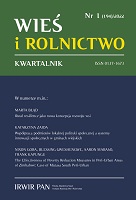The Effectiveness of Poverty Reduction Measures in Peri-Urban Areas of Zimbabwe: Case of Mutasa South Peri-Urban
The Effectiveness of Poverty Reduction Measures in Peri-Urban Areas of Zimbabwe: Case of Mutasa South Peri-Urban
Author(s): Nixon Goba, Blessing Gweshengwe, Aaron Mabaso, Frank KapunguSubject(s): Rural and urban sociology, Economic development, Socio-Economic Research
Published by: Instytut Rozwoju Wsi i Rolnictwa Polskiej Akademii Nauk
Keywords: poverty; peri-urban; quality of life; poverty reduction; Sustainable Development Goals; Zimbabwe;
Summary/Abstract: The question of “how effective poverty eradication measures being implemented in Zimbabwe are” has not been addressed in the context of peri-urban areas. This question must be addressed since the country has a high incidence of poverty and is working towards achieving Sustainable Development Goal 1 i.e. “No Poverty”. Using a case study of Mutasa South peri-urban, this research therefore sought to answer the question. It adopted an exploratory methodology and data was collected from residents in Mutasa South peri-urban area and key informants from NGOs and Mutasa Rural District Council. The study found that poor people in the study area experience different forms of poverty. Poverty reduction measures being implemented in Mutasa South peri-urban include food aid, education assistance, cash transfer, microfinance and farming programmes. The effectiveness of these measures was examined based on the extent to which the programmes cover the multiple dimensions of poverty found in the study area. As the study found, the programmes take into account all the dimensions of poverty but there are aspects of these dimensions that they pay less attention to and tend to exclude some of the poor.
Journal: Wieś i Rolnictwo
- Issue Year: 194/2022
- Issue No: 1
- Page Range: 57-76
- Page Count: 20
- Language: English

